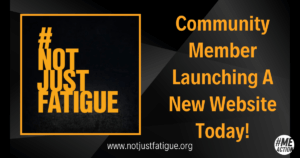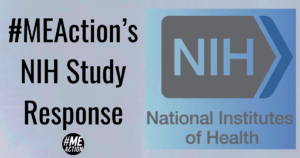On Feb. 8, I wrote to NIH Director Francis Collins to express concern over the NIH’s mostly negative responses to the CFS Advisory Committee’s latest recommendations; the slow pace of formal patient involvement in the NIH’s new ME/CFS research program; and the originally-released use of the outdated Reeves criteria for selecting patients for the upcoming NIH inpatient study.
Collins responded on Feb. 17:
Dear Brian,
Thank you for your email. I am always glad to hear from you. I would like to address your concerns regarding NIH’s activities on ME/CFS.
First, regarding the responses to the latest CFSAC recommendations, I have to say that the timing was not good for NIH. We provided those responses to HHS in September 2015, which was prior to the formation of the new Trans-NIH ME/CFS Working Group. Plans for the new Working Group were being developed, but nothing had been finalized, so we were unable to provide more substantial responses.
The Working Group is working very hard to put together research strategies that directly address some of the CFSAC recommendations, as well as those that were identified in the IOM report and the P2P workshop. They will be looking for community input and feedback on their plans soon. As you can appreciate, it takes time for plans to come together, especially when the Working Group is coordinating across 23 Institutes and Centers. They are also exploring opportunities with other federal agencies, such as the CDC and FDA, to achieve some of the goals.
The Trans-NIH Working Group and I agree on the importance of including the patient voice and formalizing communications with the community. They are planning several ways to involve the patient, clinical, and research communities, including many of the ideas you suggested, and they plan to implement many of these activities soon. I appreciate all of your excellent suggestions and have sent them on to the Working Group for consideration.
We are excited about the intramural NIH study of ME/CFS, as it will be a combined effort across multiple NIH Institutes and bring to bear unique resources of the NIH Clinical Center in trying to understand the biological basis of ME/CFS in a well-defined subset of patients. It is, however, important to acknowledge that this is only one step on the road to gaining a better understanding of the condition and then developing effective treatments.
The summary of the intramural study on ME/CFS that was posted on www.clinicaltrials.gov was incomplete and was submitted in order to get a number in clinicaltrials.gov so planning and hiring staff for the study could begin. The study team is preparing more complete and accurate information that will be posted soon on the ME/CFS website. I can tell you that patients enrolled in the NIH intramural study will satisfy the strictest ME/CFS criteria, including the Canadian Criteria, and that post-exertional malaise will be measured. A short explanation has been posted on the NIH ME/CFS website: http://www.nih.gov/mecfs/eligibility-requirements-me/cfs-clinical-study-nih.
Thank you for your comments and concerns. I look forward to continuing to work with you and the ME/CFS community as we move forward in the coming months.
Regards, Francis
This is most of my letter to him from Feb. 8:
Dear Dr. Collins,
It has taken me longer than I had planned to get back to you, but I do appreciate the call from you last fall. Thank you for taking an interest in our illness and pushing for positive change at NIH.
However, I am growing concerned that the good will among patients generated by your announcement is slipping away. The NIH’s responses to the latest recommendations from the CFS Advisory Committee disappointed many patients, including myself. Nearly every response was dismissive of CFSAC’s earnestly thought-out recommendations. These responses have patients worried that positive change is not happening quickly enough.
Here are some ideas about how NIH can continue to build a bridge to the patient community.
– Patient involvement in NIH’s research plans is vital. Appointing a patient representative – and possibly an organizational representative as well – to the Trans-NIH Working Group on ME/CFS would be a hugely positive step. [xxx and xxx] would make excellent patient advocates. They are both reasonable, forward-looking people with deep knowledge of ME/CFS research. Zaher Nahle of the Solve ME/CFS Initiative would be a good choice for an organizational representative. The ad hoc meetings Drs. Koroshetz and Whittemore have hosted recently are important, but I think it’s much more important to formalize patient and advocate involvement.
– The NIH researchers involved in the new ME/CFS research effort could host an online Town Hall for patients, advocates, clinicians, and researchers. Such an event would show openness and a willingness to consider patient input.
– Patients are waiting to hear about dedicated funding for extramural researchers. The growing cohort of ME/CFS researchers in the US working on biomarkers, cellular and molecular pathology, and potential treatments desperately needs funding. An RFA or some other mechanism dedicating a pot of money would be a very positive step. The NIH response to the CFSAC recommendation of an RFA repeated an unfortunate line that I thought had been debunked: That there are few to zero “good quality” ME/CFS funding applications. With Congress boosting the NIH budget, and with the 10% HIV/AIDS set-aside expiring, now is the perfect time for a dedicated external ME/CFS budget.
– NIH could consider funding ME/CFS Centers of Excellence to bring together clinicians and researchers. There are enough experts in the US for two or three such centers, which have been instrumental in pushing ahead new treatments for other disorders.
– NIH researchers working on ME/CFS could invite outside experts in for a seminar series. I’m sure many of the researchers I’ve gotten to know would love to share their work with NIH colleagues. Such a seminar series would cost very little but could build a lot of goodwill. I could suggest a list of researchers to invite.
– The clinical protocol posted recently suggests the NIH will be using the outdated Reeves criteria to select patients. These criteria do not include the hallmark symptom of ME/CFS identified by the IOM – post-exertional malaise. Using Reeves criteria will draw in a heterogeneous group of patients, including some who have chronic fatigue – the symptom – but do not have post-exertional malaise and do not have ME. Patients are dismayed that the IOM’s work in this area has been ignored. The P2P group by NIH convened also made this important distinction and suggested research criteria must include post-exertional malaise. The NIH team has missed an opportunity here to proactively communicate how and why they are designing the study this way. Channels of communication need to be more open.
Thanks for reading this note. I am happy to discuss any of this with you.
BV






3 thoughts on “Bad timing, Collins says of NIH response to CFSAC”
“The summary of the intramural study on ME/CFS that was posted on http://www.clinicaltrials.gov was incomplete and was submitted in order to get a number in clinicaltrials.gov so planning and hiring staff for the study could begin. ”
There’s just one problem with this explanation: it doesn’t fit with the facts. The protocol uncovered by a vigilant patient was part of a trial participant recruitment notice posted on an NIH website (1) (2). Although the study was assigned a trial number that appeared on the recruitment notice, there was never a publicly available record on the clinicaltrials.gov website. The assigned trial number came up “Not Found”. I tried it every day until the participant recruitment webpage was set to all blank (which it still is!)
Perhaps some day Dr Frances “Lucy” Collins will figure out that patients are ill, not ignorant and naive. His life, and ours, would all be much easier if NIH would stop the excuses and start funding the research.
1. http://clinicalstudies.info.nih.gov/cgi/wais/bold032001.pl?A_16-N-0058.html@chronic@fatigue@syndrome@@
2. partial screen shot of the recruitment notice:
http://thoughtsaboutme.com/2016/02/21/brian-walitts-radical-bias-disorders-of-subjective-perception-mecfs-as-normal-life-experience/nih_study_title_original/
Here is a link to a capture of the participant recruitment notice:
http://forums.phoenixrising.me/index.php?threads/nih-post-infectious-cfs-study.42873/page-24#post-700489
i agree it sounds like they were embarrassed and had to perform a quick retraction
Comments are closed.